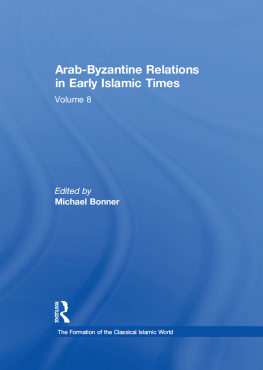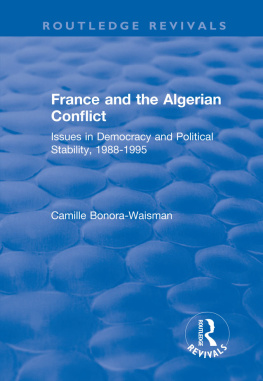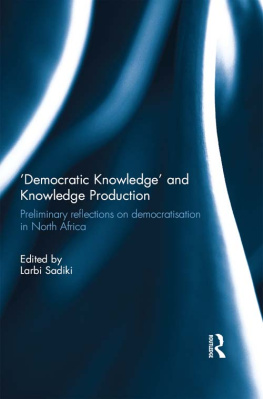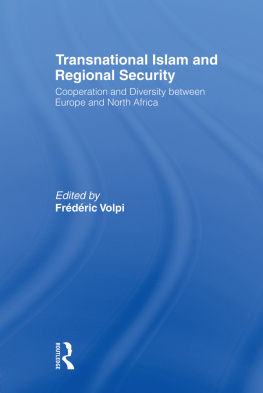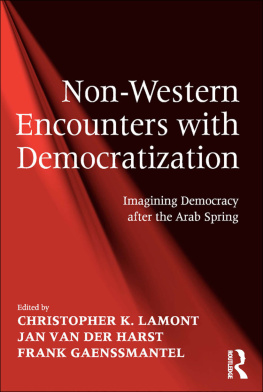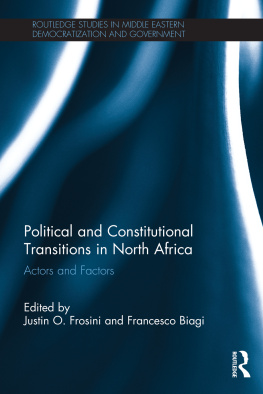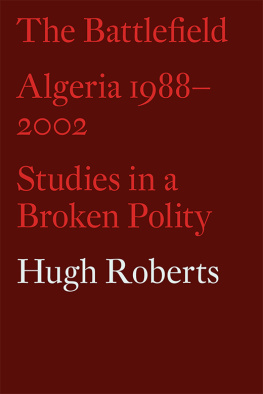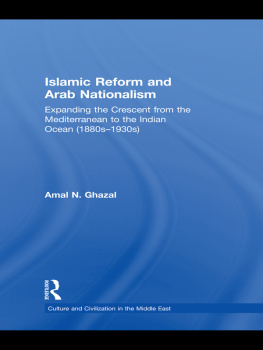Islam, Democracy and the State in Algeria
Islam, Democracy and the State in Algeria recognises the significant role Modern Algeria has played in the development of the Arab and Muslim Worlds. Its path has often been a harbinger of events and trends that have played out elsewhere. This book therefore recognises the necessity of an in depth study of Algerias statecraft, fascinating in its own right and vital for the thorough understanding of a more generalised study of the Islamic nations.
This book considers the countrys bold experiment with democratization which ultimately collapsed in the 1990s amid questions of whether the Islamic Salvation Front (FIS) should be granted power following victories in local, regional and national elections. Civil war followed bringing devastation in its wake but order has now been restored and the country has a new government. Questions on governance, Islam and international relationships now dominate Algerias political agenda. The resolution of these issues will not only determine Algerias future but will also have dramatic implications for other states in North Africa and the Western Mediterranean.
This book is a special issue of the Journal of North African Studies.
Michael Bonner is Associate Professor in Near Eastern Studies and History and Director, Center for Middle Eastern and North African Studies, University of Michigan, USA.
Megan Reif is a Doctoral Candidate in Political Science, University of Michigan, USA.
Mark Tessler is Samuel J. Eldersveld Collegiate Professor of Political Science and Director, Center of Political Studies, Institute for Social Research, University of Michigan.
Islam, Democracy and the State in Algeria
Lessons for the Western Mediterranean and Beyond
Edited by
Michael Bonner, Megan Reif & Mark Tessler
First published 2005 by Routledge
2 Park Square, Milton Park, Abingdon, Oxford OX14 4RN
Simultaneously published in the USA and Canada
by Routledge
270 Madison Ave, New York, NY 10016
Routledge is an imprint of the Taylor & Francis Group
2005 Michael Bonner, Megan Reif & Mark Tessler
All rights reserved. No part of this book may be reprinted or reproduced or utilised in any form or by any electronic, mechanical, or other means, now known or hereafter invented, including photocopying and recording, or in any information storage or retrieval system, without permission in writing from the publishers.
British Library Cataloguing in Publication Data
A catalogue record for this book is available from the British Library
Library of Congress Cataloging in Publication Data
ISBN 0-415-34829-3
Michael Bonner, Associate Professor in Near Eastern Studies and History and Director, Center for Middle Eastern and North African Studies, University of Michigan.
Megan Reif, Doctoral Candidate in Political Science, University of Michigan.
Mark Tessler, Samuel J. Eldersveld Collegiate Professor of Political Science and Director, Center for Political Studies, Institute for Social Research, University of Michigan.
Luis Martinez, Institut de Sciences Politiques, Paris, France, Research Fellow, CERI Sciences Po.
Ali Kouaouci, Lecturer in Demography, University of Montreal.
Azzedine Layachi, Associate Professor, Department of Government and Politics, St Johns University, New York.
Clement M. Henry, Professor of Government, University of Texas at Austin.
William Quandt, Edward R. Stettinius, Jr., Professor of Politics, Vice Provost for International Affairs, University of Virginia.
Boutheina Cheriet, Algerian Minister Delegate for Family and the Condition of Women.
Abdelbaki Benziane, Professor, Directeur de LENSET dOran, University of Oran Es-Senia.
Kada Akacem, Professor of Economics, University of Algiers, Algeria.
Fanny Colonna, Universit dAix-en-Provence, France.
Fulvio Attin, Jean Monnet Chair of European Union Politics, Professor of Politics and International Relations, Department of Political Studies, University of Catania.
Mohammed Akacem, Professor of Economics, Metropolitan State College of Denver, Adjunct Professor of Economics, University of Colorado.
Yahia H. Zoubir, Associate Professor of International Studies, Department of International Studies, Thunderbird, The American Graduate School of International Management.
John Entelis, Professor of Political Science and Director of the Middle East Studies Program, Fordham University.
I. William Zartman, Professor, School of Advanced International Studies, Jacob Blaustein Professor of International Organizations and Conflict Resolution and Director for the Conflict Management Program at the Paul H. Nitze School of Advanced International Studies, Johns Hopkins University.
Michael Bonner, Megan Reif and Mark Tessler
This book has its origins in a conference held at the University of Michigan, Ann Arbor, on 2729 September 2002, on Islam, Democracy and the State in Algeria: Lessons for the Western Mediterranean and Beyond. In the United States the Algerian crisis did not receive the attention it deserved, even as this crisis raged out of control in the mid- and late 1990s. After September 2001, attention grew even sparser. Yet it seemed then to the organisers, and still does, that the situation in Algeria provides a key to understanding much of what is happening in the Islamic world, as well as to the broader Mediterranean context.
Among Arab countries Algeria is notable for a number of reasons. Its colonial experience was long and intense. The French began their colonial venture in Algeria in 1830 and suppressed the most important resistance movements during the ensuing decade and a half. Approximately one million French and other Europeans came to live in the country during the century that followed, acquiring most of the best land, orienting the economy toward the mtropole, and destroying indigenous political institutions.
Algerias decolonisation experience is also dramatic and unique. Between 1954 and 1962, the Algerians carried out a guerrilla war in an effort to force France to accept Algerian independence. This followed nearly a decade of non-violent efforts toward the same goal. A million Algerians died in the war of independence, which was ultimately successful. Algeria became independent in 1962 and the overwhelming majority of the countrys colons left for France.
Despite its losses in the war, as well as the understandable disorganisation that characterised the immediate post-independence years, Algeria during the 1960s and 1970s appeared to have enormous potential. Blessed with abundant natural resources, including petroleum, as well as considerable arable land, the country experienced substantial economic development during this period. It was governed by a populist regime that was relatively free of corruption and militantly dedicated to industrialisation and the expansion of education. Despite its austerity, or perhaps because of it, and notwithstanding its commitment to what ultimately proved to be a flawed strategy of socialist development, the regime was popular and the country appeared to be making significant progress. Algeria was also a leader of the Third Worlds Non-Aligned Movement during this period.
By the 1980s, the problems of socialism in Algeria had become apparent. An absorption crisis associated with education, housing and, above all, employment, was increasingly in evidence. Aggravating the crisis was a high population growth rate, which swelled the number of young Algerians seeking schooling, apartments and jobs. Neglect of the agricultural sector was also a factor: this contributed to a rural exodus, bringing large numbers of Algerians from the countryside to the cities, and particularly to urban shantytowns, or



